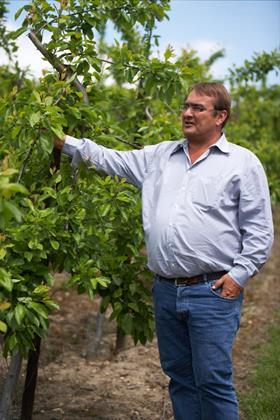
The cherry industry is blossoming, with consistently strong demand from consumers giving optimism that this is a category with boundless growth potential.
Producers believe the category, which is currently worth just over £100 million at UK retail level, has the potential to double in size, provided the right investment decisions are made throughout the supply chain.
This season the industry body British Cherries anticipates around 4,500 tonnes of UK production, kicking off in June and running through into September. The recent good weather has brought on much of the blossom in the past week, with a high-quality crop expected.
The British industry may still be a bit behind the likes of Spain and California in its development, but it is catching up fast and growers have been investing in smaller trees and high-spec polytunnels to keep out bad weather and birds.
Leading grower Mansfields has 250 acres of cherries in the ground this season, with a further 50 acres due to be planted in the autumn, an investment that completes its latest five-year plan on the fruit.
The company’s cherries are being grown on Gisela 3, 5 and 6 rootstocks, which Paul Mansfield says were selected for their consistent-quality cropping, while the varieties it is focusing on are Staccato, Sweetheart, Kordia, Lapins, Penny, Skeena and Regina. That represents a reduction on the 15 varieties Mansfields was growing a decade ago, as the focus has been on whittling it down to those crops that do the business in every area.“The main thing about what we do is we have spent a lot of time and investment in varietal development,” he explains. “We only grow varieties that tick all of the boxes, namely that they produce large, dark cherries, good shelf life, eating quality and spread of picking. In addition, 100 per cent of our cherry trees under production are covered and fertigated.”
Mansfield, who describes it as a “myth” that cherries are easy to grow, says getting the right varietal mix is crucial to build long-term sales, and the firm has a dedicated cherry farm manager with his own team to ensure the crop gets the expertise it needs.
With UK demand continuing to outstrip supply, Mansfield will soon turn his attention to the next five-year plan as he continues to invest in a product he has high ambitions for.
Berry Gardens, whose growers supply a significant chunk of the annual crop, also reports a rosy outlook for the season ahead. “At the moment we are having good weather during the blossom period,” says managing director Nick Marston. “There’s a good combination of decent weather and increased plantings, leading to higher volumes. Cherries have also been receiving great support from supermarkets, and with the British Cherries PR campaign we hope to do what we did with berries for many years.”
With UK consumers expected to munch their way through 10,000t of cherries this summer, imports are vital to ensure there is enough product on shelf. Early Spanish fruit is expected to reach British shelves in the next week, with mainstream varieties available from early May. California is also coming on stream, although volumes are lower as the US sends more to Asia, and duty and airfreight costs make it less desirable to European purchasers. According to Total Cherry’s Jon Clark, next-generation early-season varieties such as Rocket, Frisco, Nimba, Cashmere and Pacific Red are now coming through in commercial volumes in Spain, all featuring firm, dark, sweet fruit.
The Spanish season moves into French, Belgian and British supply, as well as a certain amount of product from Bulgaria and Turkey.
Despite the fact that there is a ready market for the whole British crop, the industry is not resting on its laurels and is running a marketing campaign backed by MasterChef 2013 winner Natalie Coleman, who will be creating cherry-themed recipes.
“British cherries are a versatile and sumptuous fruit that can be used in both sweet and savoury dishes,” Coleman explains. “Their rich colour is so inviting and the beautiful blossoms remind us instinctively of summertime. I would encourage anyone buying cherries this year to buy British and support British growers. I’m certainly thrilled to be doing so.”
It all shapes up to a positive picture, and Clark backs Marston’s view that the category has the potential to emulate the success seen with strawberries in the last decade. Perhaps not coincidentally, London PR agency The Red Brick Road, which manages the British Summer Fruits account, is also handling the cherry campaign.
“It’s still a developing category, but I believe cherries can become the next strawberries,” says Clark. “It’s all about getting the yields and sizes correct, as well as delivering value to consumers. It requires a massive investment, and we have to be careful we don’t devalue the product, but if we can find some way with the new varieties to improve yields, handling and processing, we can offer better value for consumers as well as viability for growers.”



